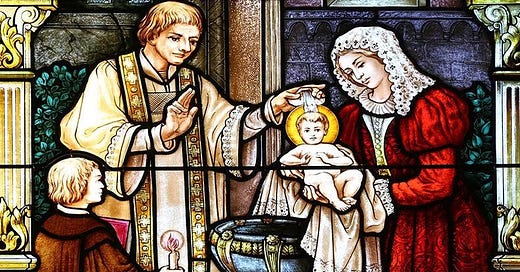We’re pleased to publish this essay on baptism from Maverick’s Outpost with permission. Read more of his work here.
I have noticed among many Christians today a certain anxiety surrounding baptism. Anxiety about when to get baptized; or, if they’re already baptized, they are concerned whether it was valid, whether they were truly committed, truly born again.
At the heart of this is a gross overemphasis on the individual’s role in baptism. And I believe this problem stems into two divergent impulses in the modern church— to delay baptism, or to rush into it.
The former is largely a Baptist thing. When I was a kid, it was common for Southern Baptists and other Evangelicals to baptize at age 9 or 10. But today I am finding many who are only now being baptized as young adults. And many still have not been baptized at all, but intend to “someday.” These are all church-going, Bible-believing Christians— yet they feel no urgency to approach the fount.
In contrast, the seeker movement (generally nondenominational) pushes strongly for immediate baptism. There is usually a call to baptism at the end of every service. The number of baptisms at a given service/event becomes a KPI. Your local megachurch pastor will proudly announce they had 200 baptisms last Sunday, urging those on the fence to get baptized today.
But in their urgency, they overlook the biblical promises in the sacrament. Baptism becomes mere performance, a public declaration of faith. I am familiar with a few local congregations that tell believers, if they were baptized as adolescents but lost the faith as teens, they should be re-baptized. After all, their original commitment may have been insincere, since they strayed from the path. They open baptism to anyone who feels the need to re-commit their faith.
It is easy to see how this leads people to question their baptism, anxious to make sure they do it right. But thankfully, this is not how the Word tells us to think about this sacrament.
Instead, our baptism should be the source of supreme confidence. Since man’s heart is corrupt, he will stumble and fall in his walk. But when he gets up, he can look back upon his baptism and find reassurance, not doubt. For in baptism we remember that we were called by Christ and saved in Him.
This is the confidence I have in baptism, and I want to share that blessed assurance with the reader by delving into the Word. So, let’s begin…
BAPTISM IN THE OLD TESTAMENT
Before we can talk about baptism, it is important to distinguish this term in its proper Biblical context. Water cleansing is a key theme throughout the Bible, but it is not perfected until Jesus. In both the Old and New Testaments we are given signs and versions of baptism that prefigure true baptism— that is, baptism into Christ.
With the Law, God gave His people certain instructions for ritual cleansing (Lev 14, Num 19). In the Gospel, we are pointed back to events from the Old which model baptism:
Peter tells us that Noah’s ark and the floodwaters correspond to baptism (1 Pet 3:20-21). Just as the righteous are spared through the ark while the sinners were drowned in the flood, so too the sinful man in us is drowned in the waters of baptism.
Paul links baptism to Abraham’s covenant of circumcision. Through Abraham, his household and descendants were saved (Gen 17:10). As Christians we are now children of this promise (Gal 4:28). For we have received “the circumcision of Christ, buried with him in baptism” (Col 2:11-12).
Paul also writes that Israel was “baptized into Moses” when they passed through the Red Sea (1 Cor 10:1-2). Just as the baptism of Moses freed Israel from their oppressors, the baptism of Christ frees us from sin.
The angel Gabriel proclaimed that John would come “in the spirit and power of Elijah” (Luk 1:17). The prophet Elijah prefigured baptism when he washed a foreign leper in the Jordan (2 Kin 5:10).
And remember, the Jordan is the river which all of Israel passed through to enter the promised land, miraculously protected by the Ark (Jos 3:13).
BAPTISM OF THE PHARISEES
We also know that ritual baptism was a common ritual practice before the time of Christ. The rabbinic priesthood would baptize “God-fearers,” or Gentiles who sought to follow the God of Abraham. Historic record of this practice is found in the Mishnah and other Jewish texts. Special pools were built for such ritual washings. It was apparently believed the pool at Bethesda could heal the unclean of their illness (Joh 5:2-9).
We see another sort of manmade baptism described in Mark’s gospel:
Then the Pharisees and some of the scribes came together to Him, having come from Jerusalem. Now when they saw some of His disciples eat bread with defiled, that is, with unwashed hands, they found fault. For the Pharisees and all the Jews do not eat unless they wash their hands in a special way, holding the tradition of the elders. When they come from the marketplace, they do not eat unless they wash. And there are many other things which they have received and hold, like the washing of cups, pitchers, copper vessels, and couches. (Mark 7:1-4)
Note that the word “wash” in this passage is the Greek root baptizo, the same word which is usually transliterated as “baptism”. But clearly, these washings do not hold the same power as Christ’s. Jesus rebukes the Pharisees and explains:
Do you not perceive that whatever enters a man from outside cannot defile him, because it does not enter his heart but his stomach, and is eliminated, thus purifying all foods?” And He said, “What comes out of a man, that defiles a man. For from within, out of the heart of men, proceed evil thoughts, adulteries, fornications, murders, thefts, covetousness, wickedness, deceit, lewdness, an evil eye, blasphemy, pride, foolishness. All these evil things come from within and defile a man.” (Mark 7:18-23)
Thankfully, Christ did not come to clean us outwardly, but to purify our hearts.
BAPTIZED INTO JOHN
John’s baptism is the final precursor to Christ’s. Here John describes his ministry to the Pharisees:
But when he saw many of the Pharisees and Sadducees coming to his baptism, he said to them, “Brood of vipers! Who warned you to flee from the wrath to come? Therefore bear fruits worthy of repentance, and do not think to say to yourselves, ‘We have Abraham as our father.’ For I say to you that God is able to raise up children to Abraham from these stones. And even now the axe is laid to the root of the trees. Therefore every tree which does not bear good fruit is cut down and thrown into the fire. I indeed baptize you with water unto repentance, but He who is coming after me is mightier than I, whose sandals I am not worthy to carry. He will baptize you with the Holy Spirit and fire.” (Matthew 3:7-11)
It perplexed the Pharisees that John was baptizing Jews, because to them only unclean things needed washing. John rebukes their pride, as though by their own blood they would be saved. John also distinguishes between the nature of his baptism (water) and Christ’s (Spirit). Only through Jesus could they receive a baptism that saves.
BAPTIZED INTO CHRIST
Finally, with the arrival of Christ and the fulfillment of His ministry, our Lord leaves with us His Holy Spirit (John 14:26). This is the Helper who we are promised to receive through baptism (Acts 2:38). What was foreshadowed throughout the Law is now perfected in Christ— in His death and resurrection. And through baptism, we are brought into these miraculous works.
It is only Christ’s baptism that saves. In Acts, the Apostles make this plain when they encounter believers in Ephesus who had not received the holy spirit. Paul asks the first question:
And he said, “Into what then were you baptized?” They said, “Into John's baptism.” And Paul said, “John baptized with the baptism of repentance, telling the people to believe in the one who was to come after him, that is, Jesus.” On hearing this, they were baptized in the name of the Lord Jesus. (Acts 19:3-5)
Although John’s disciples already committed themselves to God in John’s baptism, clearly there was something more to be received through the baptism of Christ.
But now that we are baptized into Christ, we are baptized into his death. His death is what works salvation once and for all. And as Paul writes, “Do you not know that all of us who have been baptized into Christ Jesus were baptized into his death?” (Rom 6:3). In our baptism, the old Adam is drowned away, and Christ alone lives in us by His Spirit.
If we view baptism as an act performed for God— our “commitment” before him— then of course it cannot save. Like any other human tradition, at best we might call it edifying or useful. But the baptism of Christ is a divine gift. This is why Peter can confidently say that “Baptism, which corresponds to this, now saves you; not as a removal of dirt from the body but as an appeal to God for a good conscience, through the resurrection of Jesus Christ” (1 Pet 3:21). Because baptism is the work of God, it has the power to deliver salvation to all men. Therefore we find confidence in baptism precisely because it is a gift which we are blessed to receive.
“Therefore, if anyone is in Christ, he is a new creation. The old has passed away; behold, the new has come” (2 Cor 5:17).
CHILDLIKE FAITH
Now the Anabaptists will note that infant baptism is never explicitly mentioned in the gospel. Yet neither is it expressly forbidden. Nor is the nature of baptism something that cannot be received by children. Consider what our Lord teaches us about the little ones:
“Then little children were brought to Him that He might put His hands on them and pray, but the disciples rebuked them. But Jesus said, “Let the little children come to Me, and do not forbid them; for of such is the kingdom of heaven.” And He laid His hands on them and departed from there.” (Matthew 19:13-15)
Clearly the little children are not only welcome in Heaven, but are among the greatest in His Kingdom. In this way, the child becomes the perfect image of baptismal grace. For the adult convert may outwardly appear complex and rational, but inwardly his faith is like that of a child. For this is what Christ demands of all believers:
Then Jesus called a little child to Him, set him in the midst of them, and said, “Assuredly, I say to you, unless you are converted and become as little children, you will by no means enter the kingdom of heaven. Therefore whoever humbles himself as this little child is the greatest in the kingdom of heaven. Whoever receives one little child like this in My name receives Me.” (Matthew 18:2-5)
Like a small child answering the call of their Father is how all men receive baptism. This reality is simply much more evident in the baptism of a baby, whose outward body is just as frail as the soul within. As he enters into the family of believers, he receives the strength of God that is so obviously not his own. Neither infant, nor young child, nor mature adult will ever fully comprehend the gift of salvation. Yet with childlike humility, we receive the good gifts of our Lord.
THE HOUSE OF GOD
Furthermore, the notion of a personal, individual faith is a very modern one. In the Bible we see that familial ties are important to our Lord. When Abraham received from God the “mark of righteousness through faith,” he shared it with his whole household (Rom 4:11). Notice that though Abraham’s covenant is established in faith, he is commanded to share it with his whole household. Abraham’s sons and servants received the mark upon themselves, while his wife and daughter-in-law were marked according to his headship.
The household continues to play a key role in the New Testament. Consider how Jesus tells Zacchaeus, “today salvation has come to this house,” after Zacchaeus alone expressed faith (Luk 19:19). And when the jailer asks Paul, “Sirs, what must I do to be saved?” he answers, “Believe in the Lord Jesus, and you will be saved—you and your household” (Act 16:31). Immediately after, Paul evangelizes and baptizes the man’s whole household.
Such “household baptisms” occur several times in the gospels, and while we can speculate whether these houses included children, the details that are given clearly point us back to Abraham’s household. No longer must we trace our lineage to Abraham, because we have been adopted as children of God (Eph 1:5). This is the gospel— that Christ brings salvation to all nations. Therefore just as Abraham shared his covenant with his household, so too ought we to share the covenant of baptism with our households, and on through the generations.
For in Christ Jesus you are all sons of God, through faith. For as many of you as were baptized into Christ have put on Christ. (Gal 3:26-27)
EXCEPTIONAL CASES
But if we say that baptism saves, does this thereby condemn the unbaptized?
No. Although God promises His grace to us in baptism, it is not the only means of grace. We know from the Word that “if you confess with your mouth that Jesus is Lord and believe in your heart that God raised him from the dead, you will be saved” (Rom 10:9). If we believe this is true, should we infer that the mute are condemned?
Again, no. No man is beyond Christ’s reach— whether he lacks ears to hear, knees to bow, or a tongue to confess, God’s grace can still find him.
Likewise, the Holy Spirit is able to save a man on his deathbed, a thief on a cross, and so on. But for most people who encounter the gospel, baptism is the means through which God provides salvation. He designed baptism to involve simple elements (water and Word) that are common to all nations. But by imparting His grace through baptism, Christ has not limited himself to saving only through that means.
We must also remember, there will be those who received baptism and later reject the gift found in it. Just as Israel was made righteous by the mark of Abraham, but could reject that gift and follow other gods, so too can we reject the mark of baptism and pursue our own will.
Yet it is God’s Will that we would return to Him. Like the father of the prodigal son, the Lord and His Kingdom rejoice when a child returns home. Having been adopted into His house through baptism, we need not seek another baptism. The baptized sinner who strayed from the Lord yet returns to His house is already part of the family.
And as dutiful servants of Christ, we ought to run eagerly to the baptismal font, bringing with us our households, and laying our children at the foot of His throne. Not merely out of obedience, but in an eagerness to receive the good thing that Christ has promised us.
To Christ alone be all glory.
“Not by works of righteousness which we have done, but according to His mercy He saved us, through the washing of regeneration and renewing of the Holy Spirit, whom He poured out on us abundantly through Jesus Christ our Savior, that having been justified by His grace we should become heirs according to the hope of eternal life.” (Titus 3:5-7)














